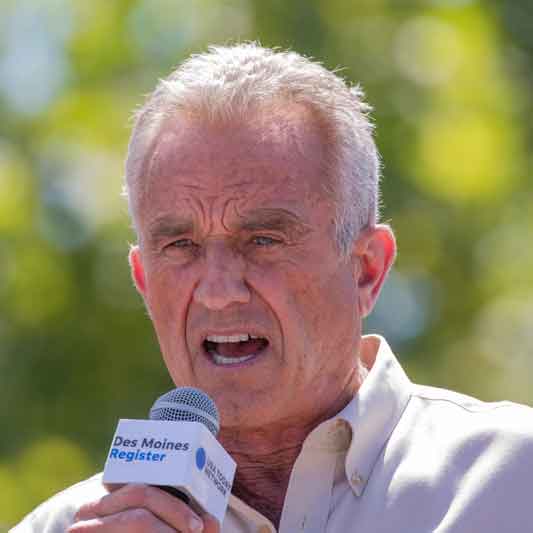Robert F. Kennedy Jr., who has been leading the Department of Health and Human Services (HHS) for just six weeks, has faced significant criticism after appointing a controversial researcher to investigate vaccines and autism.
Reports indicate that David Geier has been appointed as a “senior data analyst” at HHS to explore potential links between childhood vaccines and autism, a connection that numerous scientific studies have repeatedly disproven. Geier is listed in the HHS staff directory, working in the office of the HHS secretary, under the assistant secretary for financial resources.
The appointment has surprised vaccine experts and public health officials, who cite Geier’s controversial history. Geier lacks a medical degree and was disciplined by the Maryland State Board of Physicians in 2011 for practicing medicine without a license. Together with his father, Mark Geier, they have published studies claiming vaccines increase autism risk, though many have been retracted or discredited.
“It’s like hiring Andrew Wakefield,” commented Dorit Reiss, a law professor at UC Law San Francisco who studies the anti-vaccine movement, referencing the British doctor who published a now-retracted study falsely linking the measles, mumps, and rubella vaccine to autism.
For years, the Geiers have claimed that thimerosal, a mercury-containing preservative in vaccines, led to an increase in autism diagnoses. Yet, autism rates have not declined since thimerosal was phased out of most vaccines in the United States over two decades ago.
Jessica Steier, a public health researcher leading the nonprofit Science Literacy Lab, pointed out that the Geiers’ research is “riddled with basic flaws” and that they exhibit “patterns of an anti-vaccine agenda.”
The HHS study coincides with a measles outbreak spreading in Texas, Oklahoma, and New Mexico. Two individuals, including a six-year-old girl, have died.
Despite the outbreak, Kennedy has minimized the importance of measles vaccines. During his confirmation hearings earlier this year, Senator Bill Cassidy (R-Louisiana), a physician, urged Kennedy to renounce his past claims about vaccines and autism. Kennedy stated he would do so if presented with data disproving the link, despite existing research that already does.
When Cassidy presented Kennedy with a 2014 meta-analysis titled “Vaccines are not associated with autism: An evidence-based meta-analysis of case-control and cohort studies,” Kennedy deflected, citing a contested study and asserting, “There are other studies out there. I just want to follow the science.”
The Johns Hopkins Bloomberg School of Public Health has affirmed that there is compelling evidence from 16 well-conducted, large population-based studies indicating that vaccines do not cause autism. The theory concerning thimerosal was thoroughly investigated, and researchers found no link between the preservative and autism rates.
According to public health officials who spoke anonymously, HHS officials have instructed the Centers for Disease Control and Prevention (CDC) to transfer vaccine safety data to the National Institutes of Health (NIH) for analysis. The data reportedly includes information from four studies on vaccines and autism published in the 2000s.
When questioned about his involvement in the study, Geier told reporters: “I don’t have any comment to say. Talk to the secretary. He’s the person that’s in charge.”
Geier’s appointment is one of several contentious actions by Kennedy during his short tenure. He has also announced plans to consolidate HHS agencies and cut 20,000 jobs. Although some elements of his plan, such as refocusing the CDC on infectious disease preparedness, are not considered radical, placing vaccine skeptics in key roles has raised significant concerns.
Peter Marks, the FDA’s top vaccine official, left the agency following Kennedy’s appointment. Marks had previously criticized Kennedy’s “misinformation and lies” about vaccines.
Public health experts are concerned that appointing a researcher known for discredited claims might result in a flawed study with serious implications. They fear it could erode trust in vaccinations and further damage public confidence in the CDC, especially as vaccine hesitancy remains a significant issue.
“It seems the goal of this administration is to prove that vaccines cause autism, even though they don’t,” said Alison Singer, president of the Autism Science Foundation, a nonprofit organization funding autism research.
Numerous scientific organizations and researchers have raised serious concerns about the methodology and potential outcomes of a study led by someone with Geier’s background. Some public health officials have described the selection as a “tactical error” and a “worst-case scenario for public health.”
Kennedy has long expressed skepticism about the scientific consensus on vaccines, despite substantial evidence. During his Senate confirmation hearing, he did not categorically state that vaccines do not cause autism and requested more data, despite being presented with studies showing no link.
The study is part of a broader reorganization at HHS, where Kennedy has proposed consolidating various agencies and reducing the workforce by thousands. Senator Cassidy, who ultimately supported Kennedy’s confirmation after receiving pledges about federal support for vaccines, recently met with the HHS Secretary to discuss the proposed job cuts. However, the vaccine-autism study was not addressed during their meeting. As Kennedy continues to implement his vision for HHS, public health experts are closely observing how his administration’s vaccine positions will influence public health policy and potentially affect vaccination rates nationwide.

